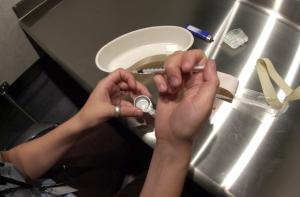The expansion of medical marijuana at the state level should proceed apace again this year.
"License plate profiling" just got a slap-down from the 10th Circuit in Denver.
Which states will be voting on medical marijuana this year is becoming clearer, but is not completely settled; a new study finds that marijuana is not implicated with bad organ transplant outcomes, and more.
From Key West to Alaska, law enforcement and prison and jail guard misconduct is exposed. Just another week on the crooked cop front.
Despite what's been called "de facto legalization," California has arrested a half million for marijuana in the last decade; Tennessee's Music City moves toward decriminalization, a Montana anti-medical marijuana initiative has come up short, and more.
An effort to knock the Arizona legalization initiative off the ballot gets slapped down, a new Nevada poll shows a very tight contest for the legalization initiative there, a new study finds that marijuana use is not implicated in organ transplant problems, and more.
Marijuana reform foes in Arizona and Missouri go to court to try to block initiatives, a second Arkansas medical marijuana initiative is poised to qualify for the ballot, Duterte's festival of death continues apace, and more.
A Seattle heroin task force has endorsed safe injection sites, the Philippine Senate is holding hearings on the ongoing massacre of alleged drug users and sellers, Colombia coca growers are protesting over unfulfilled crop substitution promises, and more.
Michigan legalizers lose a court battle, Oklahoma medical marijuana advocates look to be heading for the ballot box, the 10th Circuit rules that having license plates from marijuana states is not sufficient reason for a stop and search, and more.
This article was produced in collaboration with AlterNet and first appeared here.
It's been 20 years since California punched through pot prohibition and became the first state to legalize marijuana for medicinal purposes. Now, 25 states have medical marijuana laws, and more than a dozen more have taken the half-step of legalizing the medicinal use of cannabidiol (CBD) only -- not raw marijuana.

Coming soon to Arkansas, Florida, Montana, and North Dakota?
While some of the early medical marijuana states have now moved on to full legalization -- and more are set to this year -- states in the South and the Plains are just beginning to embrace the therapeutic use of the herb. This year could see medical marijuana finally assert itself in Dixie and on the Northern Plains.
Medical marijuana is amazingly popular nationwide. A June Quinnipiac poll had support at a whopping 89%. That same month, a Prevention Magazine poll had support at 75%, not nearly as stratospheric, but still very impressive. Support won't be as strong in states where it is on the ballot this year, but should still be strong enough to get voter initiatives over the top.
There are four states where medical marijuana initiatives are approved for the ballot this year, but before we get to those, there are still a handful of loose ends to mention. In Missouri, an initiative campaign is challenging a signature count that had it fail to qualify for the ballot; in Arkansas, a second medical marijuana initiative, this one a constitutional amendment, is still trying to gather signatures (update: that measure has now qualified for the ballot); in Oklahoma, an initiative has just passed a signature-gathering hurdle but has yet to qualify, and in Montana, an anti-medical marijuana initiative is challenging a signature count that found it coming up short. These are all long-shots at this point, but the efforts aren't definitively dead.
In the meantime, the four states definitely voting on medical marijuana in November are:
Arkansas -- The 2016 Arkansas Medical Cannabis Act. A similar initiative was narrowly defeated in 2012, and Arkansans for Compassionate Care hopes to get over the hump this year. The initiative would allow patients suffering from a long list of qualifying diseases or conditions to use medical marijuana with a doctor's recommendation. Patients could possess up to 2 ½ ounces and could grow five plants and 12 seedlings if they live more than 20 miles from a "care center." They could also have a designated caregiver grow for them, with a limit of five patients per caregiver. There would be at least 39 non-profit care centers across the state.
It's going to be a low-budget campaign. ACC says it has raised $15,000 and has a goal of $80,000. There is no significant organized opposition.
The polling is looking favorable. An Arkansas Poll from last November had support for medical marijuana at 68%, with only 26% opposed, while a June Talk Business & Politics-Hendrix College Poll had support at 58%, with 34% opposed.
Florida -- Amendment 2. Medical marijuana backers organized as United for Care were narrowly defeated in 2014 although they won 58% of the vote. That's because their initiative was a constitutional amendment requiring a 60% majority, and so is this one. It would allow patients suffering from a specified list of qualifying diseases or conditions to use medical marijuana upon a doctor's recommendation. The amount they could possess will be determined by the Department of Health. Patients could not grow their own, but would be able to purchase it at state-regulated "Medical Marijuana Treatment Centers."
This is going to be a big bucks campaign in a high-population state, just as it was last time. In 2014, Las Vegas casino billionaire and hard right Daddy Warbucks Sheldon Adelson kicked in more than $5 million to the "no" campaign. This year, he's been quiet so far, but Florida arch-drug warrior Mel Sembler has kicked in $500,000 for the opposition Drug Free Florida, and Publix supermarket heiress Carol Jenkins Barnett gave $800,000 more. United for Care has largely been bankrolled by Florida attorney and Democratic donor John Morgan. It took in more than $3 million last year, spending most of it on signature gathering, and has only raised $555,000 so far this year, although Morgan's deep pockets could come through again in the home stretch.
Even with the needed 60% majority, the polling looks good. In eight polls since January 2015, the lowest support level recorded was 61% and the highest was 80%. But the opposition is going to use that fat campaign war chest to chip away at public support.
Montana -- Initiative 182. Voters in Big Sky County approved medical marijuana in 2004, but when the scene grew too bustling, the state's conservative legislature struck back with a vengeance. In 2011, Republicans in Helena essentially gutted the medical marijuana system, shutting down dispensaries and limiting caregivers and doctors. The Montana Medical Marijuana Act repeals the limit of three patients for each licensed provider, and allows providers to hire employees to cultivate, dispense, and transport medical marijuana. It also repeals the requirement that physicians who provide certifications for 25 or more patients annually be referred to the board of medical examiners, and it removes the authority of law enforcement to conduct unannounced inspections of medical marijuana facilities, instead requiring annual inspections by the state. Patients could continue to possess up to an ounce of marijuana and four plants and 12 seedlings. The initiative also adds PTSD to the list of qualifying conditions.

There doesn't appear to be any recent polling on the initiative's prospects. Montana voters have approved medical marijuana in the past, but the earlier phase of medical marijuana expansion sparked a harsh reaction, and the state remains divided over the issue. After a lengthy court fight, some of the restrictions approved in 2011 will go into effect at the end of this month, and cries of lost patient access may bend public opinion.
There doesn't appear to be any significant fundraising or spending by either side in this campaign.
North Dakota -- Question 5. Also known as the North Dakota Compassionate Care Act and sponsored by North Dakotans for Compassionate Care, the initiative would allow people suffering from a list of specified medical conditions to use medical marijuana with a doctor's recommendation. The initiative envisions a system of non-profit "compassion centers," which could grow and sell medical marijuana. Patients living more than 40 miles from a compassion center could grow up to 8 plants, but they must notify local law enforcement in writing. The initiative also includes a creepy provision allowing the Health Department to "perform on-site interviews of a qualified patient or primary caregiver to determine eligibility for the program" and to "enter the premises of a qualified patient or primary caregiver during business hours for purposes of interviewing a program applicant," with 24 hours notice. Patients could purchase up to three ounces of marijuana every two weeks.
The polling data is as scarce as the trees on the North Dakota prairie, but a 2014 poll had support for medical marijuana at 47%, with 41% opposed.
There doesn't appear to be any significant fundraising or spending by either side in this campaign, either.
Will medical marijuana go four for four this year? It seems likely, but we're going to have to wait for November 8 to know for sure.
back to top
Drivers from pot-friendly West Coast states have long complained of "license plate profiling," claiming state troopers more interested in drug interdiction than traffic safety perch like vultures along the nation's east-west interstate highways pull them over on pretextual traffic stops -- going 71 in a 70 mph zone, failing to wait two full seconds after signaling before making a lane change, weaving within a lane -- because their plates make them suspected marijuana traffickers.
Since Colorado blossomed as a medical marijuana state around 2008 (and ever more so since it legalized weed in 2012), drivers bearing the state's license plates have been complaining of getting
the same treatment. The practice is so common and well-known along the I-80 corridor in Nebraska that Omaha lawyers
advertise about it.
Now, one Colorado driver has managed to get something done about it. Peter Vasquez sued a pair of Kansas Highway Patrol officers over a stop and search on I-70 that turned up no drugs and resulted in no arrest, and on Tuesday, a federal appeals court vindicated him.
On a 2-1 vote, the 10th US Circuit Court of Appeals in Denver ruled that the two troopers violated Vasquez's constitutional rights by stopping and searching him based primarily on the fact that he came from a state that was a "known drug source."
Cops can't do that, the court ruled bluntly. To allow such a practice would justify searching drivers from the 25 states that allow medical or fully legal marijuana.
"It is time to abandon the pretense that state citizenship is a permissible basis upon which to justify the detention and search of out-of-state motorists, and time to stop the practice of detention of motorists for nothing more than an out-of-state license plate," Circuit Judge Carlos Lucero wrote in the opinion. "Absent a demonstrated extraordinary circumstance, the continued use of state residency as a justification for the fact of or continuation of a stop is impermissible," he added.
And the troopers didn't really have much other basis for suspicion, the court noted. The troopers said their basis was that Vasquez was driving alone, at night, on a "drug corridor," from "a known drug source area," he had a blanket and a pillow in his car, the blanket might have obscured something, and he seemed nervous.
"Such conduct, taken together, is hardly suspicious, nor is it unusual," Lucero noted.
Vasquez was originally pulled over because the troopers "could not read Vasquez's temporary tag," and when that issue was dealt with, they issued him a warning ticket. What the law required, the court said, was that the troopers then end their contact with him and allow him to go on his way.
But instead, they asked him to submit to a search of his vehicle, and he declined. They then detained him for 15 minutes until a drug dog could be summoned -- another drug war tactic the US Supreme Court deemed unconstitutional in April. The drug dog found nothing, and Vasquez was then released.
The troopers may have been done with Vasquez, but he wasn't done with them or what he saw as their unlawful conduct. He filed a civil lawsuit against the two troopers, Richard Jimerson and Dax Lewis, for violating his 4th Amendment right against unreasonable searches and seizures.
The case had been thrown out in federal district court, but Tuesday's decision revives it. It also sets legal precedent for the entire 10th Circuit, meaning that cops in Colorado, Kansas, New Mexico, Oklahoma, Utah, and Wyoming can't pull you over and search you just because you have a pot-state license plate.
Kansas officials say they plan to appeal to the 10th Circuit's full bench, though, but for now, at least, it's the law.
back to top
Which states will be voting on medical marijuana this year is becoming clearer, but is not completely settled; a new study finds that marijuana is not implicated with bad organ transplant outcomes, and more.
NationalLast Friday, a study found that marijuana use is not associated with bad organ transplant outcomes. A peer-reviewed study from the journal Clinical Transplantation finds that marijuana use is not contraindicated in kidney transplants. "[R]ecreational marijuana use should not be considered a contraindication to kidney transplantation," the authors concluded. "[R]ecreational marijuana use should be systematically evaluated in a larger setting before a decision is made on what, if any, degree of use or abuse should be considered a relative or absolute contraindication, or whether use or abuse should be considered a contraindication." Even in jurisdictions that allow for medical marijuana use, hospitals routinely disqualify patients with a marijuana history from eligibility for organ transplants.
As of Tuesday, these four states will definitely be voting on medical marijuana initiatives in November. Get a look at the details of and prospects for medical marijuana initiatives that have officially qualified for the November ballot in Arkansas, Florida, Montana, and North Dakota. There is also an Oklahoma initiative that may still qualify (see below), a second Arkansas initiative that may qualify, and a Montana anti-marijuana initiative that is appealing come up short on signatures.
Arkansas
Last Friday, a second medical marijuana initiative looked set to qualify for the ballot. There's already one medical marijuana initiative on the ballot, the Arkansas Medical Cannabis Act, but there could be another. Backers of the Arkansas Medical Marijuana Amendment handed in additional signatures last Friday after they came up short in the original round of petitioning. The amendment needed 84,589 valid voter signatures, but only came up with 72,000 valid ones on July 8. Being so close, however, qualified the amendment for a second round of signature gathering, and it has now handed in another 35,000 raw signatures, meaning it should now qualify. If both initiatives appear on the ballot and both pass, the one with the most votes will become law.
On Wednesday, prohibitionists went to court to block the Arkansas Medical Cannabis Act. A group calling itself Arkansans Against Legalized Marijuana Wednesday asked the state Supreme Court to block the Arkansas Medical Cannabis Act from appearing on the November ballot. The measure has already qualified, but the group's lawsuit claims the wording of the proposal is misleading and omits key information.
Arizona
Last Thursday, the prospect of possible legalization was spurring a rush for medical marijuana licenses. More than 750 people or groups have submitted applications for 31 medical marijuana dispensary licenses to be awarded in October. Medical marijuana license holders will get first crack at new adult use licenses if the Prop 205 legalization initiative passes.
Missouri
On Monday, a group of DAs sought to block New Approach Missouri's challenge on invalidated signatures. A dozen state prosecutors have filed legal action to block the New Approach Missouri medical marijuana initiative from getting on the ballot. The group is challenging official signature counts that say it came up short, but the DAs argue that that isn't the real issue. They argue that the state cannot put on the ballot issues that would result in laws in conflict with US law.
Montana
Last Thursday, an anti-marijuana initiative failed to qualify for the ballot, but will challenge the signature shortfall. An initiative seeking to repeal the state's medical marijuana law has failed to qualify for the November ballot after coming up short on valid signatures. The Safe Montana campaign claims the state improperly rejected or lost signatures and has filed suit to challenge the state's decision. Meanwhile, the I-182 initiative, which would rebuild the state's largely gutted medical marijuana program, has already qualified for the ballot.
Oklahoma
On Tuesday, a medical marijuana initiative took a giant step toward qualifying for the ballot. Secretary of State Chris Benge announced Tuesday that a medical marijuana initiative, State Question 788, has handed in 67,761 valid voter signatures. It only needs 65,987 to qualify for the November ballot, but there are still a couple more hurdles to overcome. The secretary of state's office must send a report on its findings to the state Supreme Court, which will then determine if the number of signatures is enough to put the initiative on the ballot.
Pennsylvania
Last Friday, the state took a step forward in implementing its medical marijuana system. The state Health Department has released a draft of the rules for the state's nascent medical marijuana industry. The more than 90 pages of draft regulations create a roadmap for aspiring medical marijuana growers and processors who are competing for 25 lucrative permits.
[For extensive information about the medical marijuana debate, presented in a neutral format, visit MedicalMarijuana.ProCon.org.]
back to top
From Key West to Alaska, law enforcement and prison and jail guard misconduct is exposed. Just another week on the crooked cop front. Let's get to it:
In Nashville, Tennessee, a Nashville Metro Police officer was arrested last Tuesday for punching a drug suspect in the face after she got stuck with a needle hidden in the suspect's bra. Officer Elizabeth Berry-Loucks was searching the woman suspect after arresting her on heroin and gun charges, and reacted to the needle-stick by immediately hitting her in the face. She is now charged with misdemeanor assault.In Key West, Florida, a Monroe County jail deputy was arrested last Thursday after he allegedly agreed to let a convicted drug dealer escape in exchange for $400,000 in cash he needed to pay off credit card debts. Elizardo Ortueta, 50, was caught red-handed picking up cash from an undercover informant. First, Ortueta asked the imprisoned drug dealer for $50,000 in exchange for preferential treatment, but then approached him seeking $400,000 and offering to help him escape. The drug dealer instead ratted him out, and he went down in an undercover sting. He now faces felony charges of receiving unlawful compensation for official behavior, smuggling contraband into a corrections facility, use of a two-way communications device to facilitate a felony and a misdemeanor charge of not having a valid Florida driver's license, although he has a valid one from North Carolina.
In Kinston, North Carolina, a state prison guard was arrested Saturday after being caught with marijuana on his person as he came to work. Guard Kristopher Williams, 22, got nailed with three grams of the green. He is charged with possession of a controlled substance on prison premises.
In Point MacKenzie, Alaska, a former state prison guard pleaded guilty last Monday to smuggling heroin and marijuana into the Goose Creek Correctional Center. Adam Jason Spindler copped to one count of drug conspiracy and one count of possession of a controlled substance with intent to distribute. Spindler went down after the Department of Corrections warned the FBI it had information he was smuggling drugs into the prison. He's looking at up to 20 years in federal prison, but will probably get much less since he pleaded guilty.
In Auburn, Georgia, a former Auburn police officer pleaded guilty last Friday to stealing drugs and money from one drug trafficker while working for another. Charles Hubbard, 51, conducted fake police stops to steal drugs in exchange for cash payments. He got $5,000 for one such incident. In another incident, he stole money from a confidential informant, giving him a receipt from the "East Metro Drug Task Force," which does not actually exist. He copped to drug trafficking and conspiracy charges and will be sentenced in November.
In Rome, Georgia, a former Floyd County sheriff's deputy was sentenced last Thursday to 10 years in prison after pleading guilty to repeatedly stealing prescription pills. Jessie Stiles had been indicted on 53 counts, including multiple counts of theft by taking and drug possession, as well as five counts of exploiting an elderly person, three counts of burglary, and 10 counts of violating his oath of office. It wasn't clear which counts he actually copped to.
back to top
Despite what's been called "de facto legalization," California has arrested a half million for pot in the last decade; Tennessee's Music City moves toward decriminalization, a Montana anti-medical marijuana initiative has come up short, and more.

Filipino President Rodrigo "The Punisher" Duterte (theinfluence.org)
California Saw Half a Million Marijuana Arrests in the Last Decade. And you thought pot was virtually legal there already. A new report from the Drug Policy Alliance shows that far from "de facto legalization," tens of thousands of Californians are still getting arrested for marijuana offenses each year. Even though the state decriminalized pot possession in 2011, thousands are still arrested for marijuana misdemeanors each year, and the burden of arrests falls disproportionately on blacks, Latinos, and youth.
Report Finds West Virginia Could Make Millions By Legalizing Marijuana. The West Virginia Center on Budget and Policy released a report Thursday saying that if the state legalized marijuana and taxed it at 25% of its wholesale price, the state could collect an estimated $45 million a year. And if just 10% of marijuana users living within 200 miles of the state came to buy legal weed there, the state could make $194 million a year. It would also save most of the $17 million a year it currently spends enforcing pot prohibition.
Nashville Moves Toward Marijuana Decriminalization. Tennessee's second largest city (less than a thousand people fewer than Memphis) is headed for decrim. The city council Tuesday gave its initial approval to a measure that would make possession of up to an ounce a civil infraction punishable by a $50 fine. It's not a done deal yet, though, and the police are grumbling. Stay tuned.
Medical Marijuana
Possible Arizona Pot Legalization Spurs Rush for Medical Marijuana Licenses. More than 750 people or groups have submitted applications for 31 medical marijuana dispensary licenses to be awarded in October. Medical marijuana license holders will get first crack at new adult use licenses if the Prop 205 legalization initiative passes.
Montana Anti-Medical Marijuana Initiative Fails To Qualify for Ballot, But Challenges Signature Shortfall. An initiative seeking to repeal the state's medical marijuana law has failed to qualify for the November ballot after coming up short on valid signatures. The Safe Montana campaign claims the state improperly rejected or lost signatures and has filed suit to challenge the state's decision. Meanwhile, the I-182 initiative, which would rebuild the state's largely gutted medical marijuana program, has already qualified for the ballot.
International
Philippines President Duterte Slams "Stupid" UN Criticism of Drug War Killings.President Duterte, who has presided over hundreds of drug war killings since assuming office just weeks ago, has pushed back against criticism of his policies by the United Nations. ""Here comes the UN, easily swayed, and coming with a very stupid proposition,"Duterte said in a speech on Wednesday at an event for police officers also attended by foreign diplomats. "Why would the United Nations be so easily swayed into interfering in the affairs of this republic?" Duterte has ordered police not to hesitate to kill and even urged ordinary citizens and communist rebels to join in the war against drugs. Drug users are "not viable human beings," he said.
back to top
An effort to knock the Arizona legalization initiative off the ballot gets slapped down, a new Nevada poll shows a very tight contest for the legalization initiative there, a new study finds that marijuana use is not implicated in organ transplant problems, and more.

coming soon to Pennsylvania (wikimedia.org)
Arizona Judge Rejects Lawsuit Trying to Knock Legalization Initiative Off the Ballot. Maricopa County Superior Court Judge Jo Lynn Gentry has dismissed a lawsuit brought by opponents of the Prop 205 legalization initiative. The lawsuit had challenged the 100-word initiative summary that will appear on ballots, but Gentry ruled that the summary "substantially complies with the law." The foes, led by Arizonans for Responsible Drug Policy, said they will appeal.
Nevada Poll Has Legalization Initiative Under 50%, But Still Leading. A new Nevada poll from Suffolk University shows a tight race ahead. The poll had support for the Question 2 legalization initiative at 48%, with 43% opposed, and 9% undecided.
Medical Marijuana
Study Finds Marijuana Use Not Associated With Bad Organ Transplant Outcomes. A peer-reviewed study from the journal Clinical Transplantation finds that marijuana use is not contraindicated in kidney transplants. "[R]ecreational marijuana use should not be considered a contraindication to kidney transplantation," the authors concluded. "[R]ecreational marijuana use should be systematically evaluated in a larger setting before a decision is made on what, if any, degree of use or abuse should be considered a relative or absolute contraindication, or whether use or abuse should be considered a contraindication." Even in jurisdictions that allow for medical marijuana use, hospitals routinely disqualify patients with a marijuana history from eligibility for organ transplants.
Pennsylvania Medical Marijuana System Moving Forward. The state Health Department has released a draft of the rules for the state's nascent medical marijuana industry. The more than 90 pages of draft regulations create a roadmap for aspiring medical marijuana growers and processors who are competing for 25 lucrative permits.
back to top
Marijuana reform foes in Arizona and Missouri go to court to try to block initiatives, a second Arkansas medical marijuana initiative is poised to qualify for the ballot, Duterte's festival of death continues apace, and more.

Arkansans could have two chances to vote for medical marijuana in November. (Creative Commons/Wikimedia)
Arizona Legalization Foes Appeal to State Supreme Court to Block Initiative. Even though a state superior court judge last week ruled that their challenge to the Prop 205 legalization initiative made no legitimate claims, the plaintiffs in the lawsuit have vowed to take their case to the state Supreme Court.
Medical Marijuana
Second Arkansas Initiative Should Qualify for Ballot. There's already one medical marijuana initiative on the ballot, the Arkansas Medical Cannabis Act, but there could be another. Backers of the Arkansas Medical Marijuana Amendment handed in additional signatures last Friday after they came up short in the original round of petitioning. The amendment needed 84,589 valid voter signatures, but only came up with 72,000 valid ones on July 8. Being so close, however, qualified the amendment for a second round of signature gathering, and it has now handed in another 35,000 raw signatures, meaning it should now qualify. If both initiatives appear on the ballot and both pass, the one with the most votes will become law.
Missouri DAs Seek to Block Medical Marijuana Initiative Campaigns Challenge on Invalidated Signatures. A dozen state prosecutors have filed legal action to block the New Approach Missouri medical marijuana initiative from getting on the ballot. The group is challenging official signature counts that say it came up short, but the DAs argue that that isn't the real issue. They argue that the state cannot put on the ballot issues that would result in laws in conflict with US law.
International
Duterte's Philippines Drug War Death Toll Doubles to 1800. The number of people killed in President Rodrigo Duterte's campaign against drug users and sellers has now reached 1,800, police said Monday. Police said they had killed more than 700 drug offenders, while more than 1,000 killings were carried out "outside police work." The UN has called on Manila to end the extra-judicial killings, but Duterte has responded by saying he could quit the UN.
Mexico Police Accused of Massacring 22 Suspected Cartel Members. The deaths of 22 alleged cartel members in a May 2015 incident at a ranch in Michoacan was not a gun battle, but a mass execution, the country's human rights commission declared last Friday. The commission said police killed the men, then moved bodies and planted guns to support the official account that there had been a shoot-out. "The investigation confirmed facts that show grave human rights violations attributable to public servants of the federal police," said the commission president, Luis Raul Gonzalez Perez. National Security Commissioner Renato Sales, who oversees the federal police, rejected that charge, and did so at a press conference called before the commission had finished its own.
back to top
A Seattle heroin task force has endorsed safe injection sites, the Philippine Senate is holding hearings on the ongoing massacre of alleged drug users and sellers, Colombia coca growers are protesting over unfulfilled crop substitution promises, and more.

Vancouver's InSite drug consumption room. Something similar could be coming to Seattle. (vcha.ca)
Arkansas Attorney General Rejects 2018 Legalization Initiative Wording, Again. Attorney General Leslie Rutledge has again rejected the wording of a proposed constitutional amendment to legalize marijuana. The proposal is from Mary Berry of Summit. Rutledge wrote Monday that the proposal has ambiguities around licensing and the role of various state agencies in overseeing legal marijuana commerce. Berry successfully submitted a similar proposal for this year, the Arkansas Cannabis Amendment, but it failed to get enough signatures to qualify for the ballot.
Northern Marianas Senator Reintroduces Marijuana Legalization Referendum Bill. Sen. Sixto Igisomar has redrafted what was formerly a medical marijuana bill and turned it into a full-on legalization bill. The new version, Senate Bill 19-106, is now before the Senate Committee on Health and Welfare. If approved by the legislature, the measure would then go before the voters.
Harm Reduction
Seattle Heroin Task Force Endorses Safe Injection Sites. The Heroin Task Force empanelled by Seattle Mayor Ed Murray and King County Executive Dow Constantine has endorsed open safe injection sites for drug users. The task force is now working on formal recommendations on how it might work and the legal challenges it could face. Those recommendations are expected next month.
International
Philippine Senators Open Hearing on Drug War Killings. The Senate Justice Committee opened an inquiry Monday into the killings of more than 1,800 alleged drug users and sellers during an ongoing crackdown spurred by President Rodrigo Duterte. Committee chair Sen. Leila de Lima said she was worried by the killings and that police and vigilantes could be using the crackdown "to commit murder with impunity." National Police Chief Ronald de la Rosa, who said he did not condone extrajudicial killings, took heat for failing to stop vigilante killings. "This is like anarchy," said Sen. Antonio Trillanes IV. "It's continuing under your watch."
Colombia Coca Growers Say Government Not Living Up to Crop Substitution Promises. Coca growers in Putumayo province have been protesting for the past month, saying the government is eradicating coca crops without providing substitute crops as promised. Clashes between riot police and protestors have left at least one farmer dead, with dozens others injured.
back to top
Michigan legalizers lose a court battle, Oklahoma medical marijuana advocates look to be heading for the ballot box, the 10th Circuit rules that having license plates from marijuana states is not sufficient reason for a stop and search, and more.

Medical marijuana will be on the ballot in at least four states. (Creative Commons/Wikimedia)
Michigan Legalizers Lose Court Bid to Get on Ballot. The backers of the MI Legalize legalization initiative have struck out in court in their bid to get their measure on this year's ballot. The group had collected some 354,000 signatures, well above the 220,00 required, but more than 200,000 of the signatures were gathered outside a 180-day window that the State Board of Canvassers was the only time signatures could be considered. The campaign argued that the 180-day rule was unconstitutional and unfair, but the state Court of Claims ruled Wednesday that the Board of Canvassers was correct. The campaign says it will appeal to the state Supreme Court, but the election clock is ticking and time is running out.
Medical Marijuana
These Four States Will Definitely Be Voting on Medical Marijuana in November. Get a look at the details of and prospects for medical marijuana initiatives that have officially qualified for the November ballot in Arkansas, Florida, Montana, and North Dakota. There is also an Oklahoma initiative that may still qualify (see below), a second Arkansas initiative that may qualify, and a Montana anti-marijuana initiative that is appealing come up short on signatures.
Arkansas Prohibitionists Go to Court to Block Medical Marijuana Initiative. A group calling itself Arkansans Against Legalized Marijuana Wednesday asked the state Supreme Court to block the Arkansas Medical Cannabis Act from appearing on the November ballot. The measure has already qualified, but the group's lawsuit claims the wording of the proposal is misleading and omits key information.
Oklahoma Medical Marijuana Initiative Has Enough Signatures, But Is Not on the Ballot Yet. Secretary of State Chris Benge announced Tuesday that a medical marijuana initiative, State Question 788, has handed in 67,761 valid voter signatures. It only needs 65,987 to qualify for the November ballot, but there are still a couple more hurdles to overcome. The secretary of state's office must send a report on its findings to the state Supreme Court, which will then determine if the number of signatures is enough to put the initiative on the ballot.
Incarceration
Report Finds Women Increasingly Jailed for Drug Offenses. A new report from the Vera Institute for Justice finds that the arrest rate for drug possession for women tripled between 1980 and 2009 and that 29% of women in jails were there for drug offenses. Two-thirds of those women are black or Hispanic, and nearly 80% are mothers, largely single mothers. The report called for localities to adopt cite and release policies and/or decriminalizing drug possession.
Search and Seizure
Marijuana State License Plate is No Reason for Police Stops and Searches, Fed Court Rules. In a case involving a Colorado man pulled over in Kansas, the 10th US Circuit Court of Appeals has ruled that police violated his constitutional rights by stopping and searching him based primarily on the fact that he came from a state that was a "known drug source." Cops can't do that, the court ruled bluntly. To allow such a practice would justify searching drivers from the 25 states that allow medical or fully legal marijuana. "It is time to abandon the pretense that state citizenship is a permissible basis upon which to justify the detention and search of out-of-state motorists, and time to stop the practice of detention of motorists for nothing more than an out-of-state license plate," Circuit Judge Carlos Lucero wrote in the opinion. "Absent a demonstrated extraordinary circumstance, the continued use of state residency as a justification for the fact of or continuation of a stop is impermissible," he added.
International
Philippines President Could Face International Tribunal Over Drug War Killings, Senator Says. President Rodrigo Duterte could be charged with crimes against humanity at the International Criminal Court (ICC) over the wave of killings of alleged drug users and sellers since he took office two months ago, according to Sen. Leila de Lima. "There are some experts who are saying that… if this spate of killings go unabated and unchecked, it could reach that point that the ICC could send a prosecutor to our country and investigate all these for possible prosecution under the Rome Statute," she was quoted saying. "This is not a joke. The last thing we need right now is for our dear president to be subjected to an investigation by an international tribunal like the International Criminal Court. I am not threatening the president. I am just stating a fact," she added.
back to top










